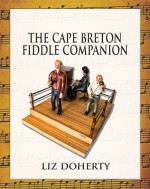The Cape Breton Fiddle Companion
Available in many bookstores and on-line. Also available for your e-reader from Kobo, Kindle store and Apple iTunes. International customers can find the book on Amazon (ANZO: thenile.com.au).
Celtic music scholar and musician Liz Doherty is no stranger to Cape Breton music – in fact, she has made a study of it. Doherty’s exposure to, and research of, the island’s music traditions was the germination for this compendium on the Cape Breton fiddle: its history, its people, the tunes, the recordings.
The fiddle music of Cape Breton Island, Nova Scotia, has its own sound, artistic standards, performance practices and etiquette. The Cape Breton fiddler of the 21st century is performing a music that was transplanted from the Highlands and Islands of Scotland in the 18th and early 19th centuries. Adapted and evolved as it has passed down through several generations, each of its exponents carrying an inherited responsibility to maintain the music’s integrity while also making it relevant for contemporary audiences.
The Cape Breton Fiddle Companion widens the field of view for future adherents and scholars of Cape Breton music, raises as many questions as it answers, and thus contributes to the ongoing conversation. Above all, it is a tribute to those who have carried and developed this wonderful music and shared it with so many of us around the world.
— —
“From Mabou to the world – the music of Cape Breton Island is celebrated internationally. Sometimes an outsider’s perspective can help shed new light on our own traditions and Liz Doherty has achieved that, and more, with this detailed overview of Cape Breton’s remarkably rich heritage of fiddle music.”
Honourable Rodney MacDonald, E.C.N.S., CEO Colaisde na Gàidhlig / The Gaelic College
“We now have a musical map into the world of the Cape Breton fiddle tradition that allows us to take the wider perspective alongside the closer view. Liz Doherty’s sustained and concentrated research has yielded a rich and detailed work that helps us chart this rewarding musical territory.”
Professor Mícheál Ó Súilleabháin, University of Limerick


